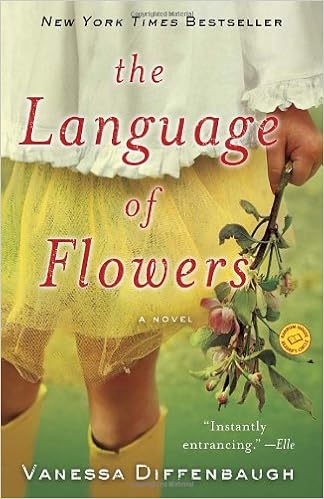 |
| Ballantine Books |
Vanessa Diffenbaugh
2011
The Summary
"The Victorian language of flowers was used to convey romantic expressions: honeysuckle for devotion, asters for patience, and red roses for love. But for Victoria Jones, it's been more useful in communicating mistrust and solitude. After a childhood spent in the foster-care system, she is unable to get close to anybody, and her only connection to the world is through flowers and their meanings. Now eighteen and emancipated from the system with nowhere to go, Victoria realizes she has a gift for helping others through the flowers she chooses for them. But an unexpected encounter with a mysterious stranger has her questioning what's been missing in her life. And when she's forced to confront a painful secret from her past, she must decide whether it's worth risking everything for a second chance at happiness."
The Good
I liked that Vanessa Diffenbaugh combined esoteric knowledge of flowers, the literal language of flowers, with the modern plight of a young girl trapped in the foster-care system. I found it intriguing to see the world from Victoria's perspective, her struggle to find normalcy and stability in a system that's anything but.
I loved learning the meanings of flowers and plants: moss for motherhood, ferns for secrecy, daisies for innocence, honeysuckle for devotion, turnips for charity, sage for good health. I was surprised to learn that sunflowers mean "false riches," and yellow roses represent "infidelity." It was interesting to see the combinations of flowers which Victoria used to communicate.
Likewise, I was intrigued by the glimpses Diffenbaugh gave into Victoria's life - into the life of a foster child, into the life of a young homeless woman struggling to make her own way in the world - and I was sometimes shocked by what I found. As the parent of a foster child, Diffenbaugh has had an inside view on the types of struggles that foster and adoptive children endure as they transition to a new home - or fall back into the system.
She knows and understands the difficulties these children face; moreover, I think she does fairly well at illuminating these issues in Victoria's character.
The Bad
I didn't feel like I could relate to Victoria. Something about the way she's characterized, or the way she tells her story, makes it difficult for me to really become attached to her as a narrator, to really sink into her story. I was eager for her to reach some kind of happy ending, but I wasn't nearly as invested as I could have been.
However, I think I would have better understood Victoria if I had read this passage from the reader's guide:
"The hardest part of writing [The Language of Flowers] was finding the right balance in Victoria's character. I wanted her to be tough, distrustful, and full of anger: all characteristics that would be true to her history of being abandoned at birth and never knowing love. But I also wanted the reader to root for her - to understand her capacity to be gentle and loving, even before Victoria understands it herself. So in the first fifty pages of the novel she spends much of her time nurturing plants: smoothing petals, checking moisture, and cradling shocked roots. This felt like the perfect way to show both sides of her character, long before it would have been possible for me to describe her displaying affection or kindness toward another human being."I think I would have better understood the emotional spirals - doubt, fear, distrust, anger and hatred - better had I read the author's interpretation of Victoria. (For that reason, The Language of Flowers may be worth a second attempt.)
The Ugly
Orphaned from an early age, Victoria bounced between foster homes and half-way houses for her entire life. She chronicles abuse and emotional distress, which is truly heartbreaking to envision. Her inability to accept love, to offer it in return is heart-wrenching - and it's even harder to watch her spiral into a familiar passage of doubt, self-recrimination, anger, resentment, depression, and neglect.
Honestly, it will break your heart.
No comments:
Post a Comment